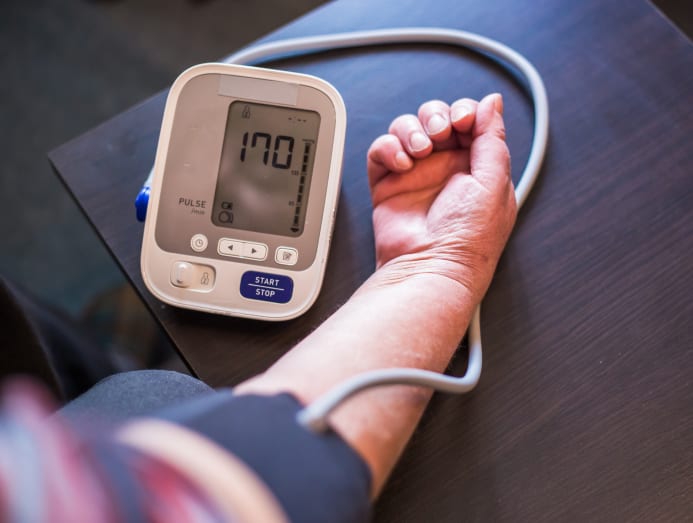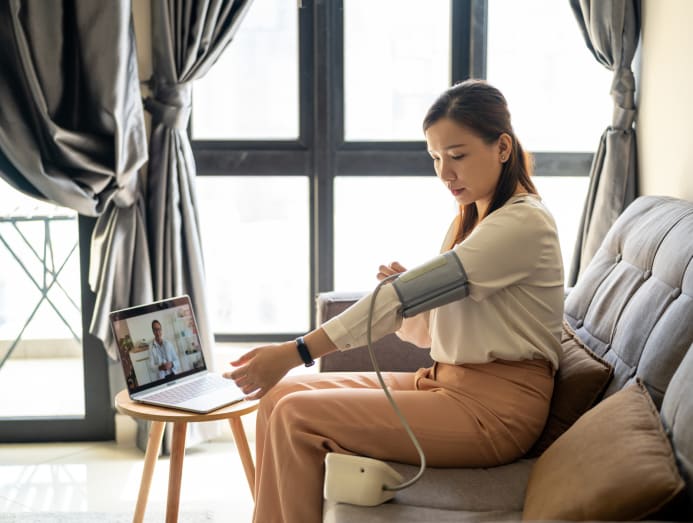Did the pandemic get your blood pressure rising? Take deep breaths – you're not alone
Advertisement
Wellness
Did the pandemic get your blood pressure rising? Accept deep breaths – you're non lone
Boilerplate claret pressure readings among Americans increased as the coronavirus spread, every bit new report suggests. The findings portend medical repercussions far beyond COVID-19.

(Photograph: iStock)
Last year was a tough one. Americans grappled with a global pandemic, the loss of loved ones, lockdowns that splintered social networks, stress, unemployment and depression.
It is probably no surprise that the nation'south blood pressure shot up.
Recently, scientists reported that blood pressure level measurements of nearly a half-meg adults showed a meaning ascension final twelvemonth, compared with the previous year.
These measurements describe the pressure of blood confronting the walls of the arteries. Over time, increased force per unit area can damage the eye, the brain, blood vessels, kidneys and eyes. Sexual role can also exist affected.
"These are very important information that are non surprising, but are shocking," said Dr Donald M Lloyd-Jones, president of the American Heart Clan, who was non involved in the report.
"Fifty-fifty pocket-size changes in boilerplate blood pressure in the population," he added, "tin can have a huge affect on the number of strokes, heart failure events and heart attacks that we're probable to exist seeing in the coming months."
The study, published as a inquiry alphabetic character in the periodical Circulation, is a stark reminder that even in the midst of a pandemic that has claimed more than 785,000 American lives and disrupted access to health care, chronic health conditions must notwithstanding be managed.
Almost half of all American adults take hypertension, or high blood pressure, a chronic condition referred to as a "silent killer" because information technology can have life-threatening consequences, though it produces few symptoms.

Hypertension may too put people at greater risk for severe disease if they are infected with the coronavirus. (The show for that link is mixed, co-ordinate to the Centers for Disease Command and Prevention.)
The new study, by researchers at the Cleveland Clinic and Quest Diagnostics, examined data from hundreds of thousands of employees and family members in wellness programs that tracked blood pressure level and other health indicators, like weight. The participants, from all 50 states and the District of Columbia, included people who had elevated blood pressure and normal blood force per unit area at the outset of the written report.
"We observed that people weren't exercising equally much during the pandemic, weren't getting regular intendance, were drinking more and sleeping less," said Dr Luke Laffin, the lead author, a preventive cardiologist who is co-director of the Center for Blood Pressure level Disorders at the Cleveland Clinic. "We wanted to know, was their blood pressure level changing during the pandemic?"
Hypertension may as well put people at greater risk for astringent disease if they are infected with the coronavirus.
The researchers found that blood pressure readings changed little from 2022 to the first iii months of 2020, but increased significantly from April 2022 through December 2020, compared with the same period in 2019.
Blood pressure is measured in units of millimeters of mercury (mm Hg) and consists of 2 numbers. The kickoff number refers to systolic force per unit area every bit the middle contracts, and the 2d number refers to diastolic force per unit area every bit the middle rests betwixt beats. Normal claret pressure is said to be 120/80 mm Hg or less, although at that place is decades long dispute about the optimal levels.
The new study plant that the boilerplate monthly change from April 2022 to December 2020, compared with the previous year, was 1.ten mm Hg to 2.l mm Hg for systolic blood pressure, and 0.14 to 0.53 for diastolic blood pressure.
The increases held true for both men and women, and in all age groups. Larger increases in both systolic and diastolic claret pressure were seen in women.

The average age of the study participants was just over 45, and slightly more than half were women. Simply critics said the failure to include information on the race and the ethnicity of participants was a significant weakness in the report, as hypertension is much more prevalent among Black Americans than among white or Hispanic Americans.
Black people have also been unduly affected by the pandemic. Laffin said information on race and ethnicity was available only for 6 per cent of the report participants, so an analysis would not be meaningful.
Simply there is a big deviation between Black Americans and white and Hispanic Americans when it comes to hypertension, said Dr Kim Williams, a cardiologist at Rush University Medical Center in Chicago and an author of the national claret pressure guidelines that were issued in 2017.
"The hypertensive country has been epidemic in the African American population for decades," he said. "Our therapies take improved and our attempt at calling it out accept improved, yet the gap is widening. And we know the pandemic has striking different cultures and different aspects of social club in different ways."
The causes of an overall increase in blood pressure are non clear, Laffin and his colleagues said. The reasons may include an increase in booze consumption, a decline in do, ascent stress, a driblet in doctors' visits and less adherence to a medication regimen.
The researchers dismissed a possible event of weight gain, known to heighten blood force per unit area, saying that the men in the report had lost weight and that the women had not gained more weight than usual.

But other experts pointed out that average figures for weight gain might mask gains in segments of the population.
"Information technology is probably multifactorial," said Lloyd-Jones, referring to the overall rising in claret force per unit area. "Only I recall a critical slice is that nosotros know so many people lost contact with the health care arrangement, and lost control of blood pressure and diabetes."
Americans must pay greater attention to overall health and the management of underlying medical conditions despite the pandemic, Laffin said, adding that the penalty for not doing and so might outlast the coronavirus itself.
"There are as well public health consequences from not seeing your dr. regularly, making poor dietary choices and not exercising," he said. "If nosotros remember about the long-term implications, that's potentially more profound."
By Roni Caryn Rabin © The New York Times
This article originally appeared in The New York Times.
Source: New York Times/yy
schneidertheried75.blogspot.com
Source: https://cnalifestyle.channelnewsasia.com/wellness/did-pandemic-get-your-blood-pressure-rising-take-deep-breaths-youre-not-alone-291706
0 Response to "Did the pandemic get your blood pressure rising? Take deep breaths – you're not alone"
Post a Comment